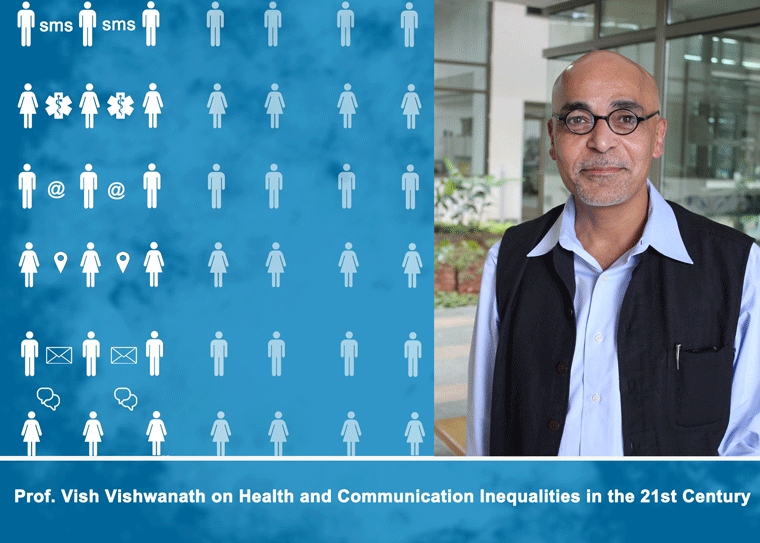Public Lecture by Prof. Vish Vishwanath
Recently, NCBS hosted a talk by a researcher who is asking a very different set of questions about illness, health and their relationship to something that we might not immediately see - information and communication. The public lecture, “Health and Communication Inequalities in the 21st Century: Observations from the Field” focused on how communication and access to information can play a critical role in promoting health and preventing disease.
Vish Vishwanath, professor of Health Communication at the Dana Farber Cancer Centre and the Harvard School of Public Health is not your typical cancer/health researcher. Working in a hard-core bench science research center, the perspective his work brings can be radical. Vish uses a cross disciplinary approach to explain something important: Why are the poorest people sicker than the rest of us? What could be the best way to design interventions to produce the optimum health outcomes in this group?
For some time now, the link between social factors and health-related outcomes has been widely acknowledged. However the mechanisms characterizing this link are yet to be articulated and remain a subject of continued investigation across disciplines. Vish Vishwanath, drawing on the structural influence model (SIM) of health communication, has built a strong research program exploring information needs on illness, health information-related media use, and the access to such information. Socioecological and socioeconomic disparities, he says, are at-least in part, mediated by communication inequalities which manifest as inequalities in knowledge and risk perception, and in turn on health seeking behaviours. He also proposes that while functions such as income, education and social status are deeply important determinants of health, developing interventions to modify them is not a simple or obvious solution. Addressing communication inequalities could provide a more practical approach what can be intractable problem of the poor bearing a disproportionate burden of disease in our societies.
He presented data from the United States which shows that despite significant successes in public health campaigns such as the anti-tobacco/smoking cessation programs, the gap between the rich and poor in both health seeking behaviours as well as health outcomes, is widening. There appear to be several structural factors that determine how and when an individual seeks to change behaviours that will produce better health outcomes. In the 21st century, the so-called ‘information age’, Dr. Vishwanath showed that there exists a deep digital-divide between the rich and the poor. The poor often have long interruptions in access to the internet and cells phones, dispelling the myth that most people have continuous access to information over the internet. This is important in a time when medical care is being characterized by shared decision making between physicians and patients. The poor then seem to have less control over decisions about their health because they just do not have access to knowledge that can help make informed choices.
In addition to individual access to information, he also discussed more insidious measures used by powers such as the tobacco industry to manipulate media to promote their unhealthy products. This is particularly true in the Indian context where popular media like cinemas are exploited to promote unhealthy habits such as smoking. What is needed then is a comprehensive structural approach that develops policies that improve access to information. In a country like ours, work such as this can provide insights into the complex issues that the interaction between poverty and illness present.
In his own words, Vish has chosen to stand outside the margins of the traditional contours that describe inquiry into health and illness. This is a reflection perhaps of the marginalized populations he works with: the urban poor, immigrants and visible minorities in the United States - those whom most policy level interventions generally do not account for. His work seeks to build bridges between the ‘haves’ and ‘have-nots’ of the information age – seeking to discover ways in which providing better access to health information by (harnessing technology and sensitive policies) can improve public health outcomes, which eventually could lead to one very important thing: healthy individuals.
About Prof. Vish Vishwanath: Dr. Viswanath is a Professor of Health Communication in the Department of Social and Behavioral Sciences at the Harvard School of Public Health (HSPH). His primary research is in documenting the relationship between communication inequalities, poverty and health disparities, and knowledge translation through community-based research to address health disparities.
About the Public Lecture series
(http://www.ncbs.res.in/pastevents/Public%20Lectures)
(http://www.ncbs.res.in/HistoryScienceSociety/content/2014-events)
NCBS and inStem have an active program of Public Talks and Colloquia, which involve general talks by eminent public figures on science, science policy and society issues. These talks are accessible for a very wide audience, including students in neighboring scientific institutions and serve to raise awareness both of international science and other issues of relevance in the Indian scientific context.

Comments
Post new comment